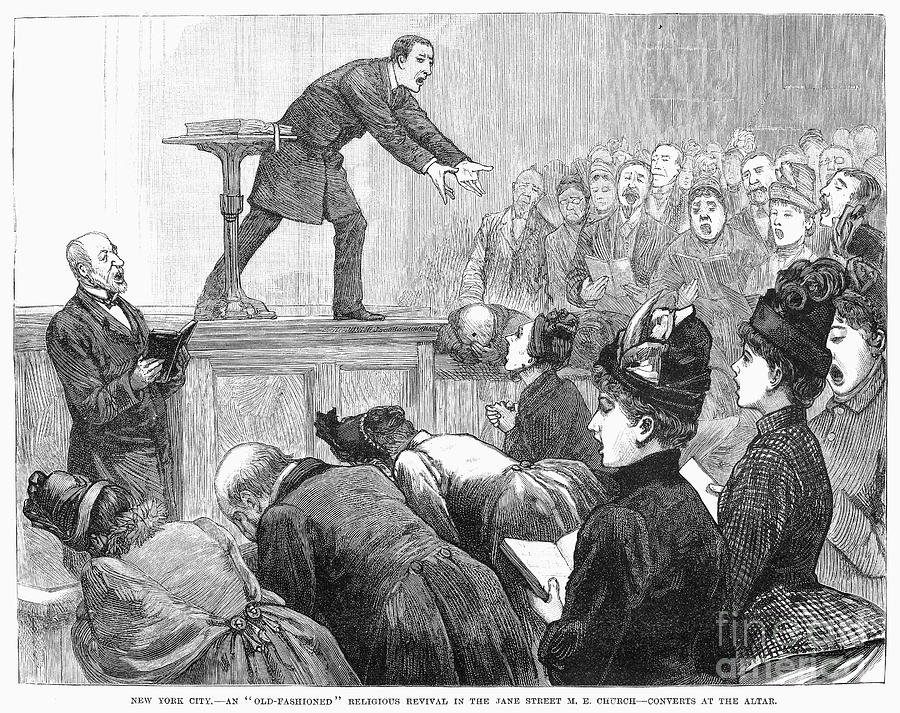What if the “Old Paths” Are Actually New? (Part 3)
In Parts 1 and 2, we discussed if the “old paths” are actually new (they are) and how the actual old paths have been pushed aside, forgotten, and marginalized. We then looked at how those methods shaped Fundamentalism into the post WWII era. Now, we will consider how these methods have persisted to the present.
Once Finney’s model was fully ingrained and inculcated in entire generations (by the 1960s), the “bigness movement” among Baptist churches started in America. Churches competed with one another for the largest numbers, hosting literal circuses, giving attendance awards, giving away merchandise and other gimmicks, and teaching their people to rack up “decisions” like a telemarketer logging sales on the whiteboard. Church leaders were each striving to be the next great spiritual leader.
Then, in the 1970s through the 90s, Jack Hyles would through his “Pastor’s School” influence men from all over the country in the ways brought down from Finney to Graham, Rice, and The Sword of the Lord publication. (see Part 2) The primary thrust was often “soul-winning,” a word they ripped from the Old Testament and applied to New Testament witnessing because of its persuasive element, i.e. “winning.” The pressure for numbers was now on.
To effectuate these soul-winning numbers, in the 1980s Curtis Hutson would literally change the definition of the word “repentance” that true Baptists had historically held.
“The problem and confusion is not preaching repentance but attaching the wrong definition to the word. For instance, to say that repentance means to turn from sin, or to say that repentance is a change of mind that leads to a change of action, is to give a wrong definition to the word” (Curtis Hutson, Repentance:What Does the Bible Teach? Sword of the Lord, 1986, p. 16).
Except that changing one’s mind is the meaning of the word!
Hyles also wrote:
“What makes the wrath of God abide on a person? Believing not! So, from what must a person repent in order to be saved? He must repent of that which makes him lost. Since ‘believing not’ makes him lost, ‘believing’ makes him saved. The repentance there is a turning from the thing that keeps him from being saved to the thing that saves him. So, yes, there is a repentance from unbelief in order to believe. It is simply a change of direction. It means a turning around. You are going away from believing, and you decide to turn around and believe. You change your direction; you change your mind. With your will you believe and rely upon Christ to save you. In order to believe, you have to repent of unbelief. That which makes a man lost must be corrected” (Dr. Jack Hyles, Enemies of Soulwinning, 1993).
This effectively turns repentance into the same thing as faith, which defies all logic and Scripture when Paul uses both words as separate things in Acts 20:21. They’re two completely different words and meanings!
I don’t mean to say that everything men like Hyles and Hutson did was unredeemable. Certainly there was real fruit in some of that… something about a broken clock or a blind squirrel. However, I think more harm might have been done than help, though that’s difficult to quantify. This methodology has left countless “burned over” parts of the country. Non-Christians may be lost, but they’re not stupid. They know when someone is trying to punk them with methods, means, and measures. Again, I’m not saying no one was ever saved under these ministries. Certainly some were.
The “bigness movement” of decades ago also left countless people “two-fold the children of hell” because they think they are born again, but are not. It’s also my contention that the easy-believism professions that came about from all of this is what has set the stage for the great apostasy, or falling away, so long as easy-believism persists. True believers can not fall away; only ones who think they are believers, but are not.
Finney himself would later say of this own movement, “The great body of those who were thought to have been converted were a ‘disgrace to religion’” (Murray, p.289).
This is seemingly the same result of the alleged modern revivals of recent years. This is the natural outcome of false conversions.
In fact, even Finney's own conversion seems based in emotional experiences and feelings and sounds duboius! He described it this way:
"The Holy Spirit … seemed to go through me, body and soul... I could feel the impression, like a wave of electricity, going through and through me. Indeed it seemed to come in waves of liquid love, for I could not express it in any other way."
Finney's influence still exists today. Consider these videos: here and here. His influence is all over in Baptist churches that have the Hyles or Sword of the Lord lineage. Interestingly, in my personal experience, many practitioners of Hyles’ methods often no longer admit where they were trained because of the stigma brought about by Hyles’ personal corruption and immorality, and that of his son-in-law. However, they still employ his methods — they’ve simply now “classed it up” for a more modern crowd.
Things like Paul Chappels’ Spiritual Leadership Conference, and the Northeast Vision Summit and the national Sword conference are all modern iterations of Finney’s new measures. As my friend Pastor Scott Blair said, “They may have stopped swallowing goldfish for crowds, but the philosophy is still there.” These are simply newer types of pragmatic, numbers-driven, emotionally-charged movements bringing the Finney mindset to the modern era.
So, in conclusion, while I don't think it's wrong to use the term "old paths", I think we should be clear what we mean by that. Many today are simply too ignorant of history and Scripture to see that the "old paths" they are referring to aren't really the old paths at all. They should fix that. And it’s not just the old Fundamentalists. Some young preachers today are adopting new methods that are unbiblical and lowering their standards. Shame on those young men. So perhaps some criticism is needed of both the old and the young in this case. Pragmatism comes in many flavors.
There is a small resurgence right now of young(er) men who are striving for the true methodology of biblical ministry and high standards, not Finney's old paths/new measures. But these young men are often scoffed at and marginalized simply because they don't shout, have massive congregations, high pressure altar calls, or aggressively push for decisions. These young men are often accused of having "dying churches" by Finney's present day "old paths" counterparts.
Be not deceived. Much of the “old paths” zeal, style, and methodology of the last 150-200 years was foreign to our Baptist forefathers that landed on this continent, and foreign to all of church history.
I’ll finish with an illustration:
In 2012, a California man was at a flea market when he found a small wooden puzzle box with Chinese symbols on it. The wood had that characteristically dry feel of wood that had been aging for centuries. The paint was crackled. It was clearly very old. And yet, the puzzle tiles on the surface moved and glided one against another with ease. “The craftsman that made this must have been remarkable,” thought the man, “for as ancient as this box appears, it functions quite well.” He purchased the item for a few dollars, trying not to act too excited and give away the value of what he had found. Later, he searched the internet for an expert in such antiques only to find that none existed in the United States, but rather in China. So, he arranged private travel to China and went to great expense to ensure it was safely transported with him. After many days, the expert finally examined the box. In less than a minute, he had solved the puzzle. They leaned in closely to see the contents. What they discovered, affixed to the green felt bottom inside, was a white plastic sticker that said, “Hobby Lobby: $2.99, Made in China”. The man could hardly believe his eyes. He refused to concede that his box was worthless. He tried to sell it at auction, but none accepted it. Why would he not accept the obvious conclusion? Simple. Because he had already invested so much.
Thomas Balzamo
Thomas Balzamo is the pastor of Colonial Baptist Church in Bozrah, Connecticut, host of the Reason Together Podcast, and associate editor of ReasonTogether.fm.
You can read more of Thomas’s writing on his personal site, ThomasBalzamo.com




